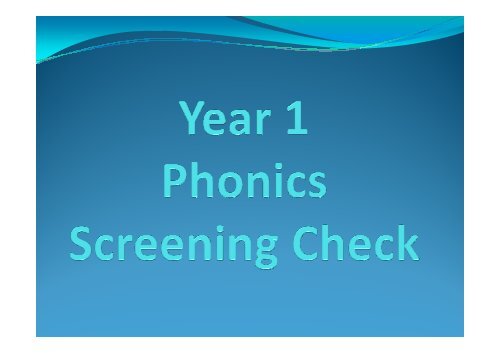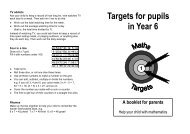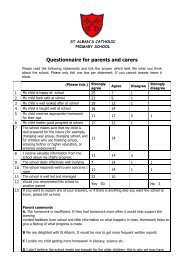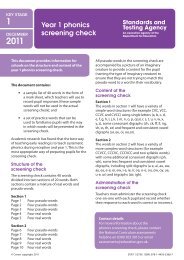Phonics Screening Check Information
Phonics Screening Check Information
Phonics Screening Check Information
Create successful ePaper yourself
Turn your PDF publications into a flip-book with our unique Google optimized e-Paper software.
Background information<br />
This year all schools will be required to administer a<br />
phonics screening check to children in Year 1.<br />
The phonics check has been devised by the<br />
Department for Education and it is compulsory for all<br />
schools.<br />
The Department for Education describes it as a short,<br />
light-touch assessment to confirm whether individual<br />
pupils have learnt phonic decoding to an appropriate<br />
standard.
What will the check consist of?<br />
The screening check contains 40 words divided into<br />
two sections of 20 words. Both sections contain a<br />
mixture of real words and pseudo-words.<br />
All pseudo-words in the screening check are<br />
accompanied by a picture of an imaginary creature to<br />
provide a context for the pupil (naming the type of<br />
imaginary creature) to ensure that they are not trying<br />
to match the pseudo-word to a word in their<br />
vocabulary.
When will the check take place?<br />
The check will take place on Monday, 18 th June. If your<br />
child is absent from school on that day, the check will<br />
be carried out at the earliest opportunity.
How will the check be administered?<br />
I will carry out the check with each child on a one-toone<br />
basis on Monday, 18 th June.<br />
The check will take place in the ICT room beside the<br />
Year 1 classroom.<br />
The check should last no longer than ten minutes and<br />
if a child shows signs of distress or fatigue at any point,<br />
I will either take a rest break or stop the check.
What happens after the check?<br />
The results of each check will be sent to the local<br />
authority. Each local authority will then submit the<br />
results to the Department for Education.<br />
We will inform you of your child’s result by the end of<br />
the term at the latest.
How will the results from the<br />
phonics screening check be used?<br />
Schools’ results will not be published, although we<br />
will, of course, inform you of your child’s results.<br />
Data will be available on RAISEOnline, for use by<br />
Data will be available on RAISEOnline, for use by<br />
schools, local authorities and Ofsted as part of their<br />
inspections process.
What is the threshold for the<br />
standard in the screening check<br />
It should be noted that the Department for Education has<br />
set a very high standard for this screening check.<br />
In the pilot 18 different versions of the screening check<br />
were trialled. Each one had a slightly different threshold for<br />
the expected level ranging from 31 to 34 out of 40. The<br />
threshold for 2012 will be within this range.<br />
The threshold for 2012 will be included in the screening<br />
check materials which will remain secure until the start of<br />
the check week (18 June 2012).
What will happen between now<br />
and the date of the check?<br />
We will continue to teach phonics as usual.<br />
Before the end of this half term I will carry out a mock<br />
check with as many children as possible in order to<br />
prepare them for when they take part in the official<br />
check on 18 th June. It is hoped that the mock tests will<br />
help the children to feel more comfortable and familiar<br />
with the format of the check and to reduce as much<br />
anxiety as possible.
What can you do?<br />
Continue to encourage your child with their reading. If your<br />
child is struggling when reading at home encourage them to use<br />
their phonics knowledge to help decode each word:<br />
Say each sound in the word from left to right.<br />
Say each sound in the word from left to right.<br />
Blend the sounds by pointing to each letter, i.e. /b/ in bat, or<br />
letter group, i.e. /igh/ in sigh, as you say the sound, then run<br />
your finger under the whole word as you say it.<br />
Talk about the meaning if your child does not understand the<br />
word they have read.<br />
Work at your child’s pace.<br />
Always be positive and give lots of praise and encouragement.
Useful websites<br />
<strong>Phonics</strong>play offers a variety of free games to help children<br />
to progress in phonics. We often use games from this<br />
website in class to finish a phonics session:<br />
http://www.phonicsplay.co.uk/freeIndex.htm<br />
The literacy section of ictgames offers some games based<br />
on recognition of sounds: http://www.ictgames.co.uk/<br />
BBC bitesize has a range of literacy games aimed at children<br />
in KS1 which include phonics and spelling based activities:<br />
http://www.bbc.co.uk/bitesize/ks1/literacy/phonics/play/
FAQs<br />
More details about the screening check can be<br />
accessed on the Department for Education website at:<br />
http://www.education.gov.uk/schools/teachingandlea<br />
rning/pedagogy/a00198207/faqs-year-1-phonics-<br />
screening-check#faq1
Thank you for listening.<br />
If you have any questions I am, as ever, happy for you to<br />
email me ( awaterson@stalbans.cambs.sch.uk ). I am also<br />
available to meet by appointment if you would like to<br />
discuss anything in this regard.<br />
I would urge you not to worry or become too anxious about<br />
this screening check. Every child is individual and will<br />
make progress at their own pace, particularly between the<br />
ages of 4 and 7 years old. I will do everything I can to put<br />
the children at ease in relation to the check and will not put<br />
any undue pressure on them.





